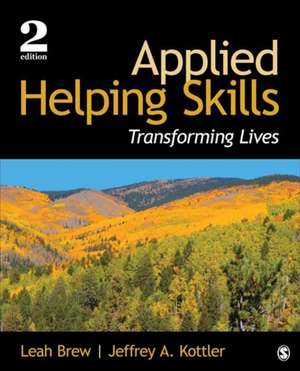Applied Helping Skills: Transforming Lives
Autor Leah M. Brew, Jeffrey A. Kottleren Limba Engleză Paperback – 15 sep 2016
Preț: 958.12 lei
Preț vechi: 1244.31 lei
-23% Nou
169.55€ • 198.81$ • 148.89£
Carte disponibilă
Livrare economică 26 ianuarie-09 februarie
Specificații
ISBN-10: 1483375692
Pagini: 488
Dimensiuni: 187 x 232 x 23 mm
Greutate: 0.82 kg
Ediția:Second Edition
Editura: SAGE Publications
Colecția Sage Publications, Inc
Locul publicării:Thousand Oaks, United States
Recenzii
“This is a great text, as it provides an accessible approach to the essentials of applied helping skills and demystifies the helping profession.”
“The simplicity in the delivery of this text book is a key component is helping students at undergraduate and graduate learn the key principles involved in helping people to transform their lives. This textbook offers the student an insight into developing excellent skills in becoming therapists.”
Cuprins
Chapter 1: The Process Revealed
Reading Minds and Other Superpowers
My Psychic Powers
Secrets Revealed
How Therapists Enhance Their Powers
Power and Influence
You Gotta Be Desperate
It’s All About Leverage
Amateurs Versus Professionals
A Few Missing Ingredients
The Perfect Counseling Student
Chapter 2: Clients in Need: Individual, Social, and Cultural Factors
Cultural Context of the Client Experience
Cultural Skills and Competencies
Become Familiar With Cultural Differences
Assess Stage of Cultural Identity
Overview of a Client Concern
Ethical Considerations in the Practice of Helping Skills
How to be a Good Client
Decisions, Decisions
Chapter 3: Models of Helping
Theories and Their Offspring
An Integrated Model
Part II: Skills to Use With Individuals
Chapter 4: Skills for Builiding Collaborative Relationships
Your Best Relationships
Uses of the Therapeutic Relationship
About Empathy
Relationship Skills
Chapter 5: Skills of Assessment and Diagnosis
The Mental Status Exam
The Basics of Conducting an Intake Interview
Structured Intake Interviews
Special Considerations in Assessing Addiction
Special Considerations in Assessing Physical or Sexual Abuse
Special Considerations for High Suicide Risk
Special Considerations for Crisis Situations
Objective and Subjective Sources of Information
Models of Diagnosis
Remembering What You See and Hear
Making Things Fit Your Style
Chapter 6: Exploration Skills
An Overview of the Exploration Stage
Structuring the Conversations
Opening With a Story
Asking Questions
Reflecting Skills
Putting Reflecting Skills Together
Exploring the Past
Summarizing Themes
Chapter 7: Promoting Understanding and Insight
The Uses of Insight
The Limits of Insight
Selected Skills for Promoting Understanding
What Happens Next?
Chapter 8: Facilitating Action
Transition From Insight to Action
Dealing With Resistance
The Miracle Question
Setting Goals
Generating Alternatives
Reinforcing Behavior
Relaxation Training
Using Rehearsal and Imagery
Using Role-Playing
Using the Empty Chair
Using the Transference
Chapter 9: Maintaining Progress and Evaluating Results
Some Assessment Challenges
Skills of Evaluating Outcomes and Measuring Results: The Client’s Efforts
Skills of Evaluating Outcomes and Measuring Results: The Therapist’s Efforts
Ending Therapy Effectively
Part III: Skills to Use With Multiple Clients
Chapter 10: Skills for Family Therapy and Other Roles for Therapists
A Different Way of Looking at Things
Structuring a Family Interview
Couples Counseling
Specialized Skills for Working With Children
The Roles You Take as a Therapist
Chapter 11: Group Leadership Skills
Group Stage Development
Group Dynamics
Group Leadership Approaches
Unique Ethical Challenges
Chapter 12: Where to Go Next
What If I Don’t Know What to Do?
What If My Supervisor Finds Out How Little I Know?
What If I Hurt Someone?
What If I Don’t Have What It Takes?
Some Advice About Where to Go Next
Notă biografică
Leah Brew is Chair and Professor in the Department of Counseling at California State University, Fullerton. She teaches, presents and publishes in the areas of basic counseling skills and multiculturalism. Specifically, she has several publications and projects that have been centered on working with multiracial couples, families, and individuals. She collaborated on a project to establish Competencies for Counseling Multiracial Populations, which was endorsed by the American Counseling Association. She has a small private practice where she specializes in working with diverse clients who struggle with depression and anxiety and are survivors of trauma. She also supervises students at a community agency who are working toward their master¿s degrees in counseling.
She is active in the profession of counseling in the state of California, and helped to obtain the Licensed Professional Clinical Counseling credential in California, the last state to license counselors. She was also appointed a gubernatorial position as the LPCC representative on the state licensure board, and has taken a leadership role in improving supervision requirements in the state.
